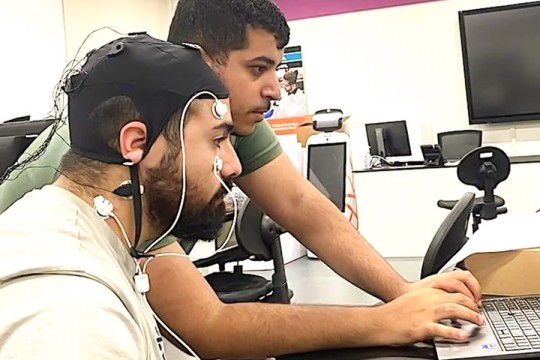Zagar, Martin, et al. "Demand for Future Skills: AI in Comprehensive Digital Business Development, Big Data Analytics, and Ubiquitous Approach to Data in Business." Proceedings of the 2024 International Conference on Smart Technologies and Education. Ed. Michael E. Auer, Reinhard Langmann, Dominik May, Kim Roos. Helsinki, Finland: Springer, 2024. Web.
Alghawi, Marwa, Jinane Mounsef, and Ioannis Karamitsos. "Optimizing Vehicle-to-Vehicle Energy Sharing with Predictive Modeling." Proceedings of the IFIP International Conference on Artificial Intelligence Applications and Innovations. Ed. Antonios Papaleonidas. Corfu, Greece: Springer, 2024. Web.
Ramesh, Hariharan, et al. "2024 IEEE International Symposium on Biomedical Imaging (ISBI)." Proceedings of the BIOINTEL: Real-Time Bacteria Identification Using Microscopy Imaging. Ed. 2024 IEEE International Symposium onBiomedical Imaging (ISBI),. Athens, Greece: IEEE, 2024. Web.
Ramesh, Hariharan, et al. "Cerviscan: Advancing Cervical Cancer Detection through Deep Learning Innovations." Proceedings of the 2024 IEEE 37th International Symposium on Computer-Based Medical Systems (CBMS). Ed. Gilberto Ochoa-Ruiz, et al. Guadalajara, Mexico: IEEE, 2024. Web.
Hassan, Saifeldin, et al. "AI-Powered Crop Monitoring for Precision Agriculture." Proceedings of the Distributed Computing and Artificial Intelligence, 21st International Conference. Ed. Springer. Salamanca, Spain: Springer Nature, 2025. Web.
Singh, Abhilasha, et al. "Fast Licence Plate Recognition of Moving Vehicles Using Deep Learning Techniques." Proceedings of the 2024 International Conference on Artificial Intelligence, Metaverse and Cybersecurity (ICAMAC). Ed. N/A. Dubai, UAE: IEEE, 2024. Web.
Al-Serkal, Abdulla, et al. "EEG-Based Cognitive Digit Perception for Brain-Computer Interfaces (BCIs)." Proceedings of the 2023 IEEE Global Conference on Artificial Intelligence and Internet of Things (GCAIoT). Ed. IEEE. Dubai, UAE: n.p., 2023. Web.
Ahsan, Fardin, Noman Sheikh, and Jinane Mounsef. "Predicting License Plate Prices using Machine and Deep Learning." Proceedings of the International Conference on ICT For Smart Society (ICISS). Ed. IEEE. Bandung, Indonesia: n.p., 2022. Web.
Mounsef, Jinane and Muhieddin Amer. "A Self-Driving Transport Vehicle Based on Fusion Camera and Radar, and Robotics (CDSR'22)." Proceedings of the nternational Conference of Control Dynamic Systems, and Robotics (CDSR'22). Ed. Mojtaba Ahmadi. Niagara Falls, Canada: Avestia, 2022. Web.
Mounsef, Jinane and Muhieddin Amer. "Bringing the Industry Expertise to the Classroom for Enhancing Life-Long Learning." Proceedings of the IEEE Global Engineering Education Conference (EDUCON). Ed. Mohammad Jemni. Tunis, Tunisia: IEEE, 2022. Web.
Hussaini, Syed Haris Roman, et al. "COVID-Band for a Safer School Environment." Proceedings of the IEEE Global Engineering Education Conference (EDUCON). Ed. Mohammad Jemni. Tunis, Tunisia: IEEE, 2022. Web.
Alashkar, Rasem, et al. "AI-Vision Towards an Improved Social Inclusion." Proceedings of the International Conference on IEEE / ITU Artificial Intelligence for Good (AI4G). Ed. IEEE/ITU. Geneva, Switzerland: n.p., 2021. Web.
Hassan, Saifeldin, et al. "A Water Behavior Dataset for an Image-Based Drowning Solution." Proceedings of the IEEE Green Energy and Smart Systems Conference (IGESSC). Ed. N/A. Long Beach, California: IEEE, 2021. Web.
Joy, John and Jinane Mounsef. "Automation of Material Takeoff using Computer Vision." Proceedings of the International Conference on Industry 4.0, Artificial Intelligence, and Communications Technology (IAICT). Ed. N/A. Online, Indonesia: IEEE, 2021. Web.
Alnajjar, Yazan and Jinane Mounsef. "Next-Generation Network Intrusion Detection System (NG_NIDS)." Proceedings of the IEEE 19th International Conference on Smart Technologies (EUROCON). Ed. N/A. Lviv, Ukraine: IEEE, 2021. Web.
Mounsef, Jinane and Lina Karam. "Augmented Sparse Representation Classifier for Blurred Face Recognition." Proceedings of the IEEE International Conference on Image Processing. Ed. IEEE. Athens, Greece: IEEE, 2018. Web.
Mounsef, Jinane and Lina Karam. "Fully automated quantification of leaf venation structure." Proceedings of the Proceedings on the International Conference on Artificial Intelligence (ICAI). Ed. N/A. Las Vegas, NV: The Steering Committee of The World Congress in Computer Science, Computer Engineering and Applied Computing (WorldComp), 2012. Web.
Mounsef, Jinane and Lina Karam. "Automated analysis of leaf venation patterns." Proceedings of the IEEE Workshop on Computational Intelligence for Visual Intelligence, CIVI. Ed. IEEE. Paris, France: IEEE, 2011. Web.

![]()








